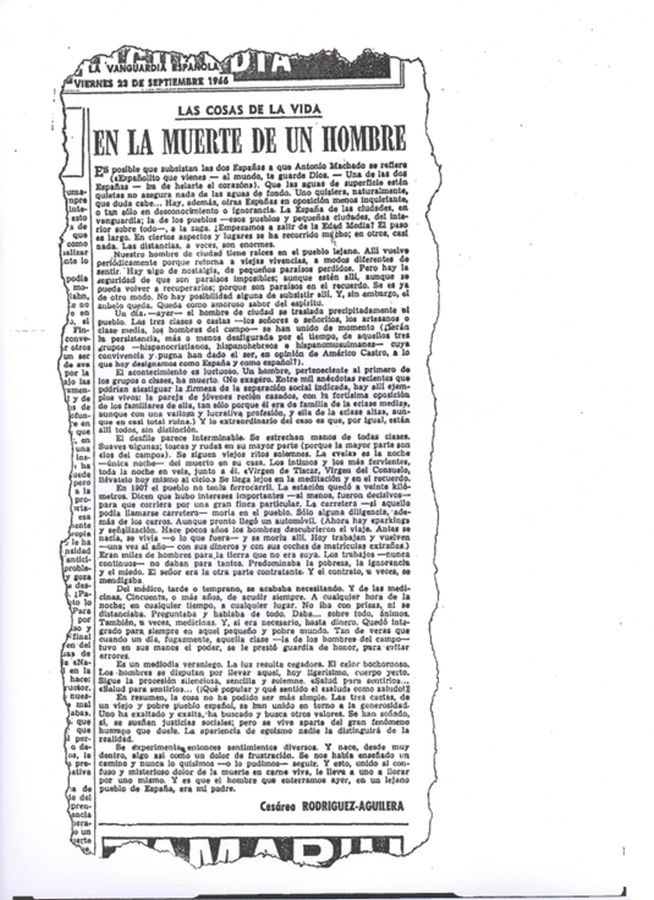
It's possible that the two Spains Anthony Machado refers to still live. The water on the surface is calm but underneath there is turbulence.
There are other Spains that are not as badly opposed as the one we are talking about; or are not known or are ignored. For Example: The Spain from the cities of the avant-garde, the Spain from the villages and towns especially those that are inland and backward.
Are we starting to emerge from the Middle Ages? -- it is a long step. Certain aspects and places have changed a lot, in others almost nothing. Distances sometimes are huge and our city-man has his routes in a faraway village; he returns periodically, revisits old childhood memories.
There's nostalgia in small, lost, paradises, but there is a certainty that it is impossible to get them back because they are paradises-of-memory and our city-man has changed in these years. It is not possible for him to live there, but his longing stays, like a loving taste of the spirit.
However one day, yesterday, city-man rushed to his village. The three social classes or caste -- los senores o senoritos -- the artisans; the middle classes; the peasants, they all got together in this moment. It was for a sad happening. A man who belonged to the first group had died.
I don't exaggerate. Among a thousand recent anecdotes that could testify to the firmness of the social separation indicated above, there are some living examples: A couple of just married youngsters, she, who married against strong opposition from her family, just, because he was from a middle-class family, even, though he had a valuable profession; and she! she who was from a high-class family who were totally ruined. That case is extraordinary because all of them were there without distinction.
The cortege looked endless; I shook hands with all classes. Some hands were soft though most of them were rough and coarse because most of the people were peasants; all and solemn rights were followed. The wake was in the night -- the only night the dead person is in his house. The most intimate and fervent will stay with him all-night long -- 'Tiscar virgin, Consolation Virgin take him with you today to heaven.' One gets far away in meditative memories.
In 1907,there was no railroad in this village, the nearest station was built 20 kilometres away. It is said though that there were very important interests to be attended to, if so, at least, they were decisive. For the railway was to pass through a very big private estate -- the road, if it could be called a road finished in the village. Besides the coaches, stage-coaches, and the carts, and with the arrival of the automobile there were 1000s of men to work land that was not their own. Soon there was not enough jobs for so many people, just poverty, ignorance and fear. But El senor was the other part of the contract and sometimes the contract was begged.
Sooner or later everybody needed the doctor and medicines. 50 or more years of always helping. Any hour of the night; anytime, anyplace. He wouldn't hurry and he wouldn't stand apart. He would ask and speak about everything. He would give … specially, he would cheer one up, also sometimes he would give medicines and if necessary even money. He was perfectly integrated forever in that small, poor world. So truly that when one day -- for a short time -- the peasant class had the power in their hands, they protected him -- to avoid mistakes. It's summer mid-day. Almost blinding light. Terrible heat. People fight to carry that very, light dead body. Behind the silent procession, simple and solemn: 'Salud para sentinrlo salud para sentinrlo. ' How loved and heartfelt was this saluation!
Things could not have been simpler. Three castes of an old and poor Spanish village have united around generosity. Social justices have been dreamt about, but they are apart from the death that hurts, so much.
One experiences different feelings. And inside something, like pain and frustration, are born. Somebody taught us, in a way that we couldn't or wouldn't follow. And this united the confused and mysterious Spain of a recent death, leaves one to cry for oneself. Because the man we buried yesterday in a faraway village in Spain was my father.
Cesare Rodrigues Aguilera
Translation: Alejandra Tuninetti (Interview from Quesada)
|

